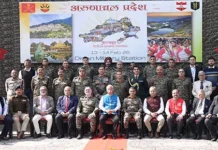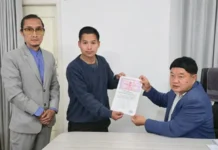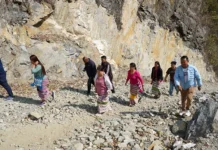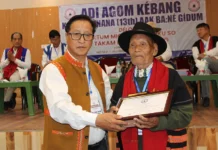[Prof Ujjwal K Chowdhury]
Arunachal Pradesh, the Land of the Rising Sun in India, goes to polls for 57 assembly seats and the two Lok Sabha seats on 11 April, the first day of the long-drawn upcoming general elections in India.
Beyond concerns about the fast deteriorating road and bridge infrastructure, poor public health, education, supplies, etc, the dominant issues impacting public opinion in this round seem to be the protest against a ‘defective statehood act’ and the matter of issuing permanent resident certificates (PRC) to outsiders.
Sensing discontent, the central government this week withdrew the Armed Forces (Special Powers) Act or the AFSPA from several districts. The act has been in place for 32 long years now in spite of the state being the most peaceful one in Northeast India.
As to the first point of discontent, the People’s Party of Arunachal (PPA), which has been demanding a constitutional amendment to the Arunachal Statehood Act of 1986, has appealed to the people of the state to consider the task of correcting and amending the ‘defective’ act as their prime agenda. They want the act amended to give Arunachal a status at par with Nagaland and Mizoram.
And this is catching on with others joining the fray, including the Janata Dal (Secular), led by Jarjum Ete, parliamentary candidate from West Arunachal, and local leaders of the National People’s Party.
It may be recalled that former parliamentarians from the state, PK Thungon and Wangpa Lowang, had tried their best to amend the defects in the Arunachal statehood bill when the bill was being tabled in the parliament in 1986.
“The governor has been equipped with more powers to deal with law and order in whatever manner he thinks fit. The people have been denied the constitutional right of defence, in respect of land, culture and social and religious practices… Therefore, it is much more appropriate that the people should be protected more than to equip the governor with more powers,” Thungon was quoted as pleading in the parliament.
Emphasizing the need to bring an end to the dependency syndrome, PPA secretary-general Kaling Jerang noted recently that the necessary constitutional amendment of the act can give Arunachalees “back our lost pride and self respect.”
Many political and intellectual voices, including that of woman activist Jarjum Ete, believe that Arunachal, in spite being one of the most resourceful states in the country, has been reduced to the status of dependency. Sadly, often with the change of the government at the Centre, the entire state cabinet changes political colours, as was seen recently in the case of the Congress ministers and MLAs, except the then CM Nabam Tuki, becoming a BJP cabinet overnight.
This dependency syndrome has to be done away with by amending the ‘defective’ statehood act, which will give the people back their ownership rights in every sense – culture, customary and traditional tribal rights over their land, forests, rivers and untapped mineral resources.
Even Gegong Apang, the longest serving chief minister of the state who joined the BJP in 2014 ahead of the Lok Sabha polls, had submitted a letter to Prime Minister Narendra Modi on this matter. He said all central leaders during their visit to the state had been approached but the Centre did not budge. Even the state assembly passed a resolution in this regard twice, in 1994 and in 2013.
Apang claimed that the then Prime Minister, Rajiv Gandhi, had assured Arunachal’s leaders that the constitution would be amended for rectification of the act but nothing has been done so far.
The act, under the 6th Schedule of the constitution of India, has made Arunachalees merely land protectors as the central government owns the minerals below the surface of the state’s soil.
Arunachal gets limited royalty from the central government for any minerals extracted because of Delhi’s apathy, unlike Nagaland, Meghalaya and Mizoram which own their mineral resources, being under the 5th Schedule.
At the core of the concerns on statehood, there are two aspects: one is of the revenue for the state from its resources, and limiting gubernatorial powers. Second, there is the concern of identity. Experts feel the urgent need to strengthen and codify the tribal customs and traditions for the future generations not to face an identity crisis under the impact of modernization.
It must be noted that the Arunachal state assembly had unanimously passed a resolution directing the state government to move the Centre for constitutional amendment with provision for special protection for the state. The assembly had also resolved to urge the Centre to expeditiously amend Article 371 H of the constitution to bring Arunachal Pradesh at par with the provisions of Article 371 A (1) with a view to provide special constitutional protection to the people of the state in respect of religious and social practices, customary laws and rights of ownership and transfer of land and its resources. However, recently, the state’s land management minister, Nabam Rebia of the BJP, told the assembly that amendment of the Arunachal Pradesh Statehood Act, 1986, being a central act, is not under the purview of the state government.
To conclude, whether the Congress or the BJP, both central governments have issued lip service without ever actually bringing this bill on the floor of the parliament in the last 30 years for any amendment.
The other vexed issue is that of the PRC. Protests broke out in Itanagar in February after a state government-appointed committee recommended providing PRCs to six non-Arunachal Pradesh Scheduled Tribe residents of Namsai and Changlang districts. Three people were killed in the clashes. Giving in to public pressure, the state government froze its decision on the controversial issue that triggered widespread violence for three days, leading to the torching of the deputy chief minister’s house.
Confirming that three people died in the violence, which saw widespread arson and the torching of the residence of DCM Chowna Mein, MoS for Home Kiren Rijiju, who is also the sitting MP of western Arunachal parliamentary constituency, had faulted his party’s state government for not being able to communicate the situation to the citizens.
Though state BJP president Tapir Gao, himself a parliamentary candidate from East Arunachal, believes that the issue will not have any impact on the poll prospects of the party, but on ground, there is widespread resentment and social media noise on this aborted attempt for PRC and the shelved CAB which calls for citizenship to immigrants by religion and was withdrawn in the Rajya Sabha recently after massive protests in the Northeast. Such optimism is, however, not shared by former BJP state general secretary Jarpum Gamlin, who is an assembly candidate this time.
With these issues being two major talking points, the Arunachal Pradesh assembly and Lok Sabha polls this year may throw up some surprises and the state may actually veer towards a multi-party state polity rather than be confined within the Congress-BJP binary. (The contributor is a media academic and columnist who spent the first 16 years of his life in Arunachal Pradesh.)




